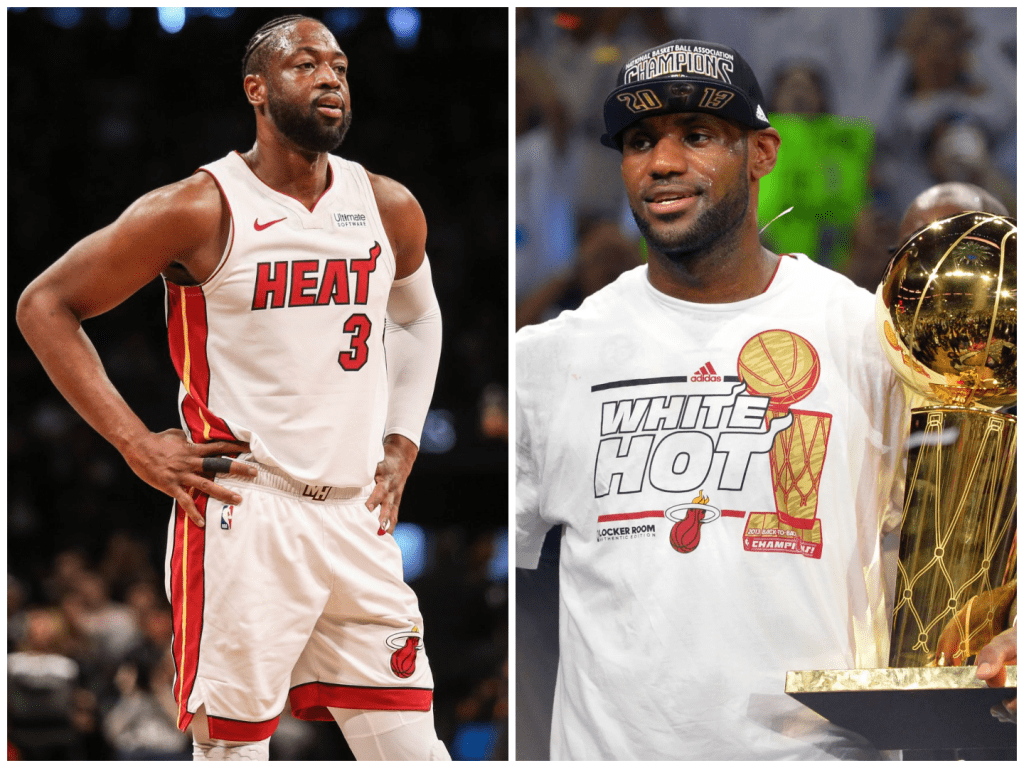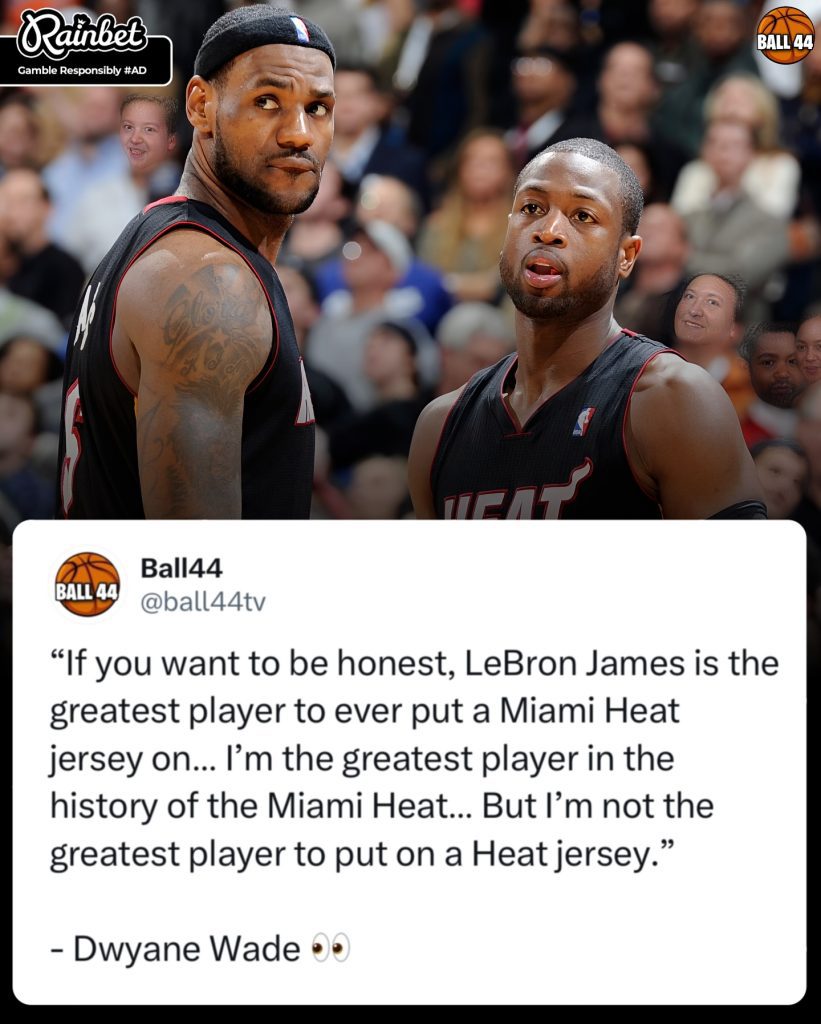
Dwyane Wade Just Admitted LeBron Is the Best to Wear a Heat Jersey—And It’s More Emotional Than You Think
When Dwyane Wade, the heart and soul of Miami Heat basketball, paused and acknowledged that LeBron James is the greatest player ever to wear a Heat jersey, it felt like a moment frozen in time. I remember watching that clip on his podcast, The Why with Dwyane Wade, where he spoke with raw honesty. “If you want to be honest,” he said, “LeBron James is the greatest player to ever put a Miami Heat jersey on… I’m the greatest player in the history of the Miami Heat… But I’m not the greatest player to ever put on a Heat jersey.” It was a twist of words that left my heart pounding and my mind racing. How could Wade claim both the greatest inside and outside at once?
I’ve known D-Wade’s journey ever since he first burst onto the scene in 2003. That rookie whose flashes of brilliance resurrected Miami’s franchise from its worst record in over a decade. I felt the excitement as he led them to their first NBA championship in 2006, earning Finals MVP honors and carving “Flash” into the record books. It was his grit, his late-game heroics, that made this city fall in love. But then came 2010, the seismic moment when LeBron James, Chris Bosh, and Wade united to form the legendary Heatles. Four straight Finals, two titles, and memories that tied them together. I watched and cheered. I felt the magic.
And now, hearing Wade’s words, I realized how layered his legacy is. He isn’t just acknowledging stats or highlights—it’s about impact, timing, and presence. Wade spoke knowingly when he said he’s the greatest in the history of the Heat. His mind travels to those years when he carried heavy burdens, from Finals runs to All-Star nods, to claiming franchise records for points and steals. He still holds the Heat’s all-time scoring record with over 21,500 points.
Meanwhile, LeBron vaulted in 2010 and led an entirely new blueprint. His two MVPs and consecutive Finals MVPs in 2012 and 2013 show why Wade called him the greatest to wear the jersey. LeBron’s arrival changed everything. He brought a spotlight brighter than Miami had ever seen, rewrote expectations, and etched his spotlight alongside Wade’s. I remember feeling that shift, like watching a city’s heartbeat change its rhythm.

But Wade didn’t shy away from his own place in that song. He reminded us that his story with the Heat began long before LeBron arrived. His Finals MVP in 2006 was his personal “I did it” moment. He carried the team through ups, downs, and the weight of expectation. He told us: “If we’re talking about body of work wearing that jersey…I’m the greatest player in Heat history.” The full sentiment still lands nicely in my bones when I think of the franchise’s journey.
What struck me most was Wade’s humility. For him to point to someone else and genuinely declare their greatness shows true confidence. It’s a mature perspective rarely seen. He’s not trying to diminish himself—he’s being realistic. He’s honoring their shared history. And that honesty feels rare in sports circles where ego can be louder than acknowledgment.
Fans have naturally reacted. Some felt an internal jolt. Of course, Wade is Miami royalty. But he’s opened a new chapter of conversation: legacy isn’t just about contribution, but about timing, exposure, and influence. I’ve seen social feeds light up. Clips of Wade’s podcast replayed across TikTok, Instagram, YouTube. Basketball forums breaking down replay by replay, comparing Finals accomplishments, stats per season, defining “greatness.” It’s insane how a heartfelt conversation between two NBA icons could ignite a new legacy debate.
At the same time, I saw a parallel conversation about Chris Bosh’s role in those Heatles years. Udonis Haslem and Norris Cole called Bosh the most important piece, not because he was better, but because his 6’11” two-way versatility kept the floor balanced. It reminded me: greatness in sports isn’t black and white. It’s relational, contextual. There’s Wade’s emotional legacy, LeBron’s global star power, Bosh’s unsung glue man role—and it all depends how you define “greatest.”
This is what Wade is doing—expanding the context. His approach is thoughtful. He’s not claiming diminished glory. He’s just drawing clear lines: he built the franchise culture. LeBron elevated the brand beyond what any Heat athlete had done before.
I like that his remark isn’t cocky or apologetic. It’s something you’d expect from a friend who sees both pride and admiration. It feels like a private conversation you’re overhearing, unfiltered and full of respect. That raw tone is rare in soundbites and highlight reels. It feels real.
His humility resonates. In the media chase of MVPs and finals, players rarely give credit inside of inner circles. Yet Wade is turning his legacy into a conversation about history—personal, shared, redefined.
And I can’t help but reflect on Miami’s evolution. Before Wade, this city was a red-hot football and tourism market—with basketball on the back burner. But he changed that. He arrived and gave Miami an identity. The arena noises from the early mid-2000s were pure, loving, maybe naive, but they were his: the birth of a fan movement.
Then came LeBron. The Heat’s brand blew up overnight. Jerseys flew off shelves worldwide. Eyes emerged from every corner of the globe, tuned in for the first time to watch South Beach basketball. That global attention, those record-breaking runs, were LeBron’s influence. Wade sees that now. He experiences it and he values it.
I can’t press pause on how this makes me feel. I remember opening nights, Heat playoff runs, catches of Heat parades. The synergy of Wade’s style and LeBron’s dominance redefined basketball for a generation. It makes sense Wade would approach that moment with emotional clarity. He knows their fates intertwined. Their accomplishments were woven together. His moment is knowing where he stands in that story—and it’s beautifully aligned, not beneath.
Dwyane Wade’s statement should humble us fans. It says greatness is complicated. It’s built of timelines, city culture shifts, playoff banners, and iconic moments. It’s not just chalkboard stats or highlight packages. It’s legacy as a living, breathing life journey.
The discussion doesn’t end here. Fans will debate who carried which Finals, which impact mattered more, which legacy burns brightest. But Wade gave us a masterclass in perspective. He admires LeBron’s era-defining presence while affirming his own rightful place. He honors teammate and rival, friend and legend.
At the end of the day, I close that podcast clip and feel something like gratitude. That moment will echo through Heat locker rooms and history books. I realized again how athletes shape eras: Wade with his fiery arrival, LeBron with his global takeover, both forever lighting up Miami.
When I think about “greatest,” I know better. It splits paths: one founded the Fire, the other launched the Flame. And Dwyane Wade, in just a few words, illuminated their shared brilliance. And that’s what makes him not just a legend, but a man worth remembering.